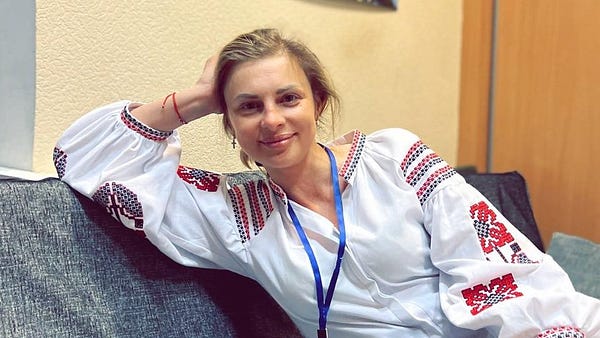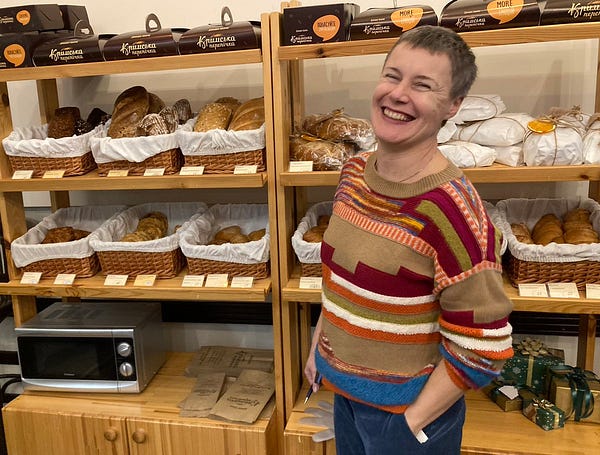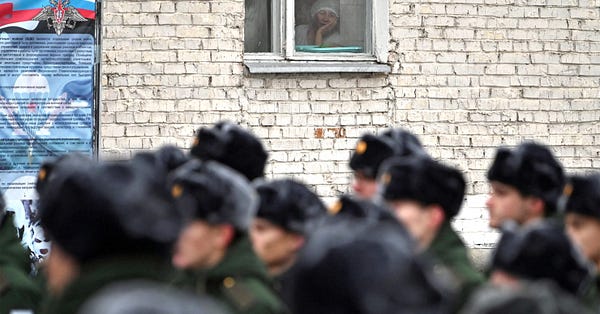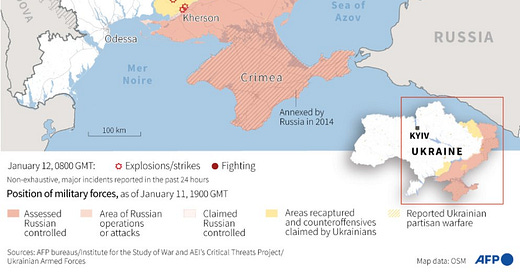Catching up…
EA Worldview’s Ukraine Up-date- hop over to Scott’s amazing hourly Ukraine up-date page. I’ll fill in with some bits and bobs.
Fred Skulthorp, The return to Kharkiv- The Critic
Russians suck it,” reads the graffiti inside a burnt out school building on the road to Kharkiv. It was here on 27 February, just three days into the invasion of Ukraine, that a company of elite Russian Spetsnaz soldiers made their last stand.
Earlier that day, they had attempted to take the Shevchenka Road into the centre of the city to cut off the Ukrainian defenders to the North and single handedly take Kharkiv. On that clear February morning with the shock and awe of the invasion underway and Ukrainian forces in disarray, for a brief moment they must have imagined the old Soviet capital of Ukraine was theirs.
Ben Cahill, Progress Report on EU Embargo and Russian Oil Price Cap- CSIS
Few observers predicted that oil prices would be this low in early 2023 following last month’s EU embargo on seaborne Russian crude and the new EU and G7 price cap on Russian oil. Brent crude was below $80 per barrel as of January 9 and Russian crude is still trading at deep discounts. The EU embargo and price cap are institutionalizing these discounts and forcing Russia to ship its oil over longer distances to a dwindling number of buyers. But while Russia’s seaborne oil exports dropped in December, they could bounce back as risk aversion fades, and it remains unclear how widely the price cap is being adopted.




Staff, Grief Will Never Go Away. Stories of Three Women Who Lost Their Beloved in This War- Ukraine World
This article is produced within the project «EU Emergency Support 4 Civil Society», implemented by ISAR Ednannia with the financial support of the European Union. Its contents are the sole responsibility of Internews Ukraine and do not necessarily reflect the views of the European Union.
DARIA HURTOVA WAS LEFT ALONE WITH TWO SMALL DAUGHTERS
Her husband, Artem Hurtovyi, died in Lysychansk, Luhansk Oblast. A Russian shell hit the plant where he was on duty.
Artem and Daria studied together at the university in Starobilsk, Luhansk Region. Daria participated in various youth activities, and Artem was a volunteer and helped the Ukrainian Armed Forces (even before Russia's full-scale invasion in February 2022). The couple met and fell in love thanks to their activism.
"He charmed me with his respect for me as a woman. He treated me very sensitively, and carried me in his arms. It was just like in the movies," Daria recalls.
Timothy Snyder, Russia's Eugenic War- Thinking about…
When Vladimir Putin says that Russians and Ukrainians are one people, what he means is that Ukrainians will agree when force is applied. Russian war planning assumed that Ukrainian identity was a superficial implant, to be extirpated by a quick military strike that would physically eliminate a foreign-backed elite. That form of genocide proved to be impossible, because it was based on an erroneous assumption. Ukrainian self-understanding is spread wide and deep through the population of Ukraine, to the point where people take initiative themselves to help their country win the war. In this sense, Ukrainian identity is far easier to observe in this war than is Russian identity.
Indeed, the war raises the question: what is Russia? Putin has failed to answer this question in any positive sense. If anything, he has harnessed Russian identity to that of Ukraine, which is not at all what he intended. Judging from Russian mass media, including the all-important talk shows, the dominant Russian self-understanding at the moment is that of an "anti-Ukraine."


Kaleena Fraga, The Haunting Story Of The Vorkuta Gulag, The Soviet Union’s Most Notorious Forced Labor Camp- Ati
Between 1931 and 1962, some 2 million prisoners passed through the Arctic gulags at Vorkuta — and 200,000 of them perished from starvation, overwork, and temperatures as low as -40 degrees Fahrenheit.
From the 1920s until the 1950s, millions of people passed through Soviet gulags, remote labor camps where political prisoners, common criminals, and rebellious peasants were forced to work. But few were as infamous as the gulags at Vorkuta.
There, about 100 miles north of the Arctic circle and over 1,000 miles from Moscow, millions of prisoners toiled in the region’s coal mines. Spread across some 130 camps, the prisoners of the so-called Vorkutlag suffered from long workdays, frigid cold, and a lack of basic supplies.
The two million people who passed through the Vorkutlag over the 20 years of its operation were criminals, intellectuals, Nazis, and others caught up in Stalin’s Great Purge to eliminate political threats. Some 200,000 of them perished there. Others rose up against their guards. And many of them, even once the camps closed down, remained in Vorkuta.



Olga Lautman, An Unorthodox Russian Vision of Heaven and Hell- CEPA
The church has been at the forefront of Russia’s unprovoked, all-out assault against Ukraine, with the 76-year-old Patriarch Kirill, a vocal supporter. He has told his 90 million followers that “sacrifice in the course of carrying out your military duty washes away all sins” and has painted Russia’s assault on Ukraine as a holy war. The message has an old-fashioned, almost medieval ring — die for Russia, go to Heaven.
Over the past 10 months of the war, the church has been a solid source of support for the Kremlin’s aggression, blessing the operation even as casualties have soared and remaining silent on the Ukrainians targeted, tortured, and killed by Russia’s army. It’s worth remembering that Kirill once described Putin’s rule as a “miracle of God”, and — perhaps more rationally — is still smarting from the loss of a third of his flock following the breakaway of the Ukrainian Orthodox Church. Kirill and his aides may hope that a Russian victory would see the return of these believers to Moscow’s spiritual fold.
Some critics have suggested that the Russian Orthodox Church has little option but to support Putin, but this is surely over-generous. Kirill, a Soviet-era cleric with extensive ties to the KGB, the President’s former employer, is absolutely dependent on the state, politically and financially. This does not seem to cause him much discomfort. Kirill was granted a Kremlin residence in 2004, the government in 2010 returned huge swaths of land and other property seized by the Soviet Union, and the state makes grants in the hundreds of millions of dollars to the organization. In June, his deputy, the intellectually impressive Metropolitan Hilarion, often described as the church’s foreign minister, was removed from his post by Putin after failing to endorse the invasion.

Amos Chapple, Reid Standish, A Journey Along Montenegro's $1 Billion Chinese-Built Highway- RFE/RL
It took eight years of construction, delays, and controversy, but Maria Kovijanic, who runs a small store along a stretch of a new $1 billion Chinese-funded highway outside the Montenegrin capital, is ready to reap the project's promised benefits.
Valued as one of the world's most expensive roads, the first 41 kilometers opened in July 2022 and cuts through Montenegro's soaring mountains and over its deep gorges, with an estimated 60 percent of the highway made up only of tunnels and bridges. For a toll fee of 3.50 euros ($3.75), a previously arduous journey north has been turned into a roughly 25-minute trip along freshly paved asphalt until the stretch of road peters out at Matesevo, the village where Kovijanic runs her shop.
She says the new, modern road is a game changer for her and other residents that live and own businesses along the highway, with the new section dramatically cutting down travel times and providing an alternative to previously congested and treacherous mountain roads in the small Balkan country of 620,000 people.


Andrew A Michta, An inflection point in history
Let's review the basics:
Until February 2022, every time Putin used military power, he scored a geopolitical win. He invaded #Georgia in 2008 - he still got Nord Stream 1; he invaded #Ukraine in 2014 - he got Nord Stream 2 nonetheless; he butchered the Syrians in Aleppo - he returned Russia to MENA with little or no objection from the West. And had #Ukraine's @ZelenskyyUa not shown real leadership and the Ukrainian people real patriotism, where do you think Europe would be today on this conflict?
Analysts like to talk about "inflection point in history," often exaggerating the importance of a given event. But the war in #Ukraine is truly a system-transforming war. We are watching an event that happens once in several generations. It sets the course of history.
Depending on how the West responds - especially Europe as the US support for #Ukraine has been there for all to see - will determine whether the European dream a Continent "whole and free and at peace" will become reality, or if Europe will once again pay a much higher price.
I say this because there is a whiff of 1938 about Europe's political stasis today. In a recent piece for @WSJ I called it a "crisis of disbelief" -- the unwillingness to accept that for three decades the West deluded itself. So, my advice (take it for what it's worth): First and foremost, let's be honest with ourselves about how misguided European Russia policy was -- all thirty years of it. And let's say it loud and clear that Russia is a fascist neo-imperial state, and that talking about "Russia's legitimate security concerns" is nuts.
We are in a twilight struggle against an enemy that doesn't live by our rules. This is one of those moments in history where one needs to step up, defeat the enemy, and only then talk about a postwar settlement. Let's stop buying into the Russian narrative.
Russia is the aggressor murdering innocent people in #Ukraine. It must be decisively defeated so that there will never be another Putin spinning the narrative about a "betrayal of the great Russian people" or any other Russian version of the Dolchstoßlegende - it is simply a lie.



Tucker Carlson is not a journalist…I don’t know what he is.












